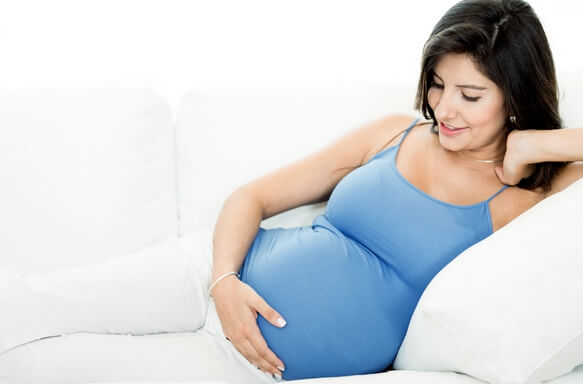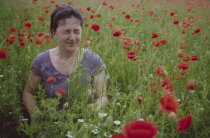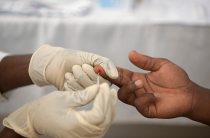The most important, long-awaited and happy period in the life of any woman is the period of pregnancy. This magical time will never be forgotten. Pregnancy brings a huge amount of positive emotions and impressions: the first movements of the fetus, the first sounds of its heartbeat, the pleasant chores of choosing clothes for the unborn baby. And everything would be fine, but there is one “but”.
During pregnancy, the immune system weakens, giving all its strength to the fetus, and the expectant mother risks falling under the influence of allergies. Allergy symptoms can arise from absolutely everything that surrounds a pregnant woman: home furniture, flowers in the house and on the street, food, animals, sunlight.
As a rule, allergies are almost impossible to cure. Only her symptoms are removed. This requires the use of various medications, many of which are contraindicated for pregnant women. But how to be?
Allergy symptoms
Typical manifestations of allergies in pregnant women are allergic rhinitis and urticaria. With rhinitis, breathing becomes difficult, the nasal mucosa swells, sensations of sore throat. Lachrymation and dry cough are often noticed. In very rare cases, a symptom such as a cough can be caused by bronchial asthma, as a result of an allergy to dust or plant pollen.
Causes
It is rather difficult to determine the main cause of the manifestation of an allergy, because, as mentioned above, anything can cause it.
Allergies can also suffer from those women who did not notice this disease before pregnancy. Let's look at the reasons in more detail. One reason could be food. As pregnancy progresses, women's diet changes. They try to consume as many fruits, dairy products, vegetables as possible. And if earlier these products did not bring discomfort, then an increase in the amount of their consumption can lead to food allergies.
In such cases, it is worth stopping their consumption for a while. Then, with the help of a small amount, check the reaction of the body. If everything is normal, then you can continue to eat them, but do not abuse them. If the reaction occurs again, stop using them during pregnancy.
Be extra careful with chocolate.
To avoid allergies to dust, regular wet cleaning of the room should be carried out. If possible, get rid of such "dust collectors": soft toys, carpets, furniture made of fabrics (it is better that all the furniture in the house is leather), blackout curtains.

Often the fault of this disease is our smaller brothers. Their body produces a harmful protein that is excreted in saliva and urine. If you notice allergy symptoms after interacting with an animal, try not to contact it again. The best option would be to give the cat or dog to someone for the entire period of pregnancy.
Stressful situations can trigger allergic symptoms. In addition, the emotional state greatly affects the development and further health of the baby.
How to deal with allergies during pregnancy
Any disease is better to prevent than to cure. Therefore, during pregnancy planning, it is better to visit an allergist. Pass all the tests assigned to them and identify possible risks of the disease. Thus, you will already know in advance what you can and cannot do.
But if the allergy, nevertheless, caught you right at the time of bearing the baby, do not be upset. The main thing is to eliminate all the symptoms as soon as possible without risk to the baby. If the disease is detected on time, then there will be no consequences and complications.
It should be noted that in the first 3-4 months of pregnancy, allergy symptoms may manifest themselves as a reaction to the fetus (toxicosis). This condition will pass by itself, no intervention is required.
If a woman knows which substance is an allergen, she should exclude it from use or stop contact with it. The next and most important thing is to see a doctor. In the case of an allergic manifestation, a hypoallergenic diet is required. It consists in the exclusion of dangerous products (even if the allergy is not for products). These products include:
- Seafood;
- Honey;
- Nuts;
- Chocolate;
- Citrus;
- Raspberries;
- Strawberry;
- Smoked products;
- Carbonated drinks;
- Cow's milk;
- Acute.
But do not think that everything is forbidden to eat. There are many foods that are allowed during pregnancy, even with allergies:
- Butter;
- Dairy products;
- Kashi;
- Veal;
- Turkey;
- Rabbit;
- Cabbage;
- zucchini;
- Apples;
- Gooseberry.
Pregnant women should not be in the company of smokers. Being a passive smoker, firstly, the fetus suffers, and secondly, tobacco smoke provokes body reactions. It will not be superfluous to limit yourself in the use of cosmetics. If this is a necessity, it is better to give preference to cosmetics made from natural ingredients.
Household chemicals like powders, other cleaning products. They have a detrimental effect. Inhaling these drugs, they damage the mucous membranes of the nose and throat. This manifests itself in the form of rhinitis, sore throat, dry cough. Frequent cases of skin manifestations: rash, irritation, urticaria, itching. Therefore, it is required to minimize the number of contacts with these substances.
Various medications should only be prescribed by a doctor who will observe and control all reactions of the immune system to these drugs. I would like to note that many antihistamines are contraindicated for taking during the bearing of a baby, these include:
- A drug such as Terfenadine significantly reduces the weight of the baby.
- Taking Dimedrol can cause uterine contractions, especially in the later stages.
- Toxic manifestations occur after the use of Astemizol.
- Suprastin is allowed to treat only acute forms of allergies.
- Also, Claritin is dangerous.
- Tavegil is taken only in extreme cases - if the life of the mother depends on it.
- It is not recommended to use Erius and Zirtek during pregnancy.
From here the conclusion is: any medications in the form of tablets and capsules should be prescribed only by a doctor. The tablet, getting into the body of a pregnant woman, affects the fetus. For some, this effect is insignificant, but for others it can be very, very harmful.
Almost all modern nasal preparations (drops, sprays) are allowed for expectant mothers. Such drugs do not have a therapeutic effect. They just relieve the symptoms. When it enters the nasal cavity, the drops envelop the mucous membrane, moisturize it, and facilitate breathing.
Prevention
It is imperative to take preventive methods to prevent the appearance of allergies during this wonderful period like pregnancy.
Of course, expectant mothers would like to walk more, be in the fresh air, in nature. Especially if it's spring and summer. But be careful. During the spread of seasonal allergies, try to be less in gardens and in nature. Ventilate the room in the evening, and even better - after rain. Use air conditioners, get an air purifier. It will also help in the fight against house dust.
 Wash air conditioner filters regularly. Carry out wet cleaning of the room. I would like to advise the most pleasant option in the prevention of allergies: just take a vacation and go to the sea for the time of flowering. Sea air will perfectly cleanse your respiratory tract, relax, improve your emotional state, which cannot but please you.
Wash air conditioner filters regularly. Carry out wet cleaning of the room. I would like to advise the most pleasant option in the prevention of allergies: just take a vacation and go to the sea for the time of flowering. Sea air will perfectly cleanse your respiratory tract, relax, improve your emotional state, which cannot but please you.
If you still stay in a noisy and flourishing city, then after the street thoroughly wash your face, clear your nose and gargle. Do not just fold street clothes - wash them immediately.
We strongly recommend that you stop smoking and be in the circle of smokers. It is probably no longer a secret that future mothers who smoke expose their baby to pathologies of lung development and growth. With their smoking, mothers doom their children to such diseases: bronchial asthma, dermatitis, pneumonia.
It would be nice to get rid of carpeting in the apartment, upholstered furniture made of fabric, soft toys, and pets.
In the fight against allergies, traditional medicine can help.
- Baths with string, oak, nettle have a calming effect. Perfectly relieve skin redness and itching.
- Use an infusion of plantain and dill to relieve pronounced itching. To do this, take 1 tablespoon of dill seeds and a dried plantain leaf. Pour this mixture with a glass of boiling water and leave for about three hours. Then just lubricate the damaged areas with these broth.
- If a pregnant woman has an allergy in the form of rhinitis, you should wash your nose with a decoction of chamomile and motherwort. But do not overdo it, as chamomile flowers can be the allergen.
- Ordinary edible rock or sea salt is perfect for washing the nose. Take 1 tbsp of salt and dilute in a glass of warm water. Rinse after every trip to the street and before going to bed.
- To reduce tearing and redness of the eyes, lotions from a decoction of chamomile and calendula will not interfere.
- Note that incredibly useful, and most importantly harmless, there is a mummy. It is necessary to dilute 1 g with a liter of warm water. Take this solution 100 g daily for a month.
Does an allergy affect the fetus?
Allergy, in itself, does not adversely affect the fetus. Allergens are not able to penetrate the fetus. Only the following has an effect on the baby:
- General depression of the mother
- The impact of drugs
Mom should know that allergies can be inherited.
Therefore, in the first months after the birth of a baby, one should be especially careful in nutrition, the environment of the child, and lifestyle. If a pregnant woman decides to self-medicate, then this can provoke the development of heart defects in the baby and damage to the nervous system.















